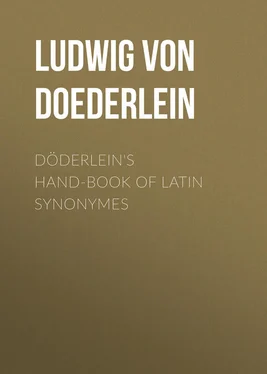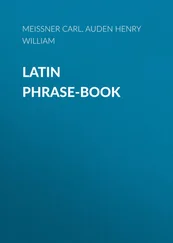Ludwig Doederlein - Döderlein's Hand-book of Latin Synonymes
Здесь есть возможность читать онлайн «Ludwig Doederlein - Döderlein's Hand-book of Latin Synonymes» — ознакомительный отрывок электронной книги совершенно бесплатно, а после прочтения отрывка купить полную версию. В некоторых случаях можно слушать аудио, скачать через торрент в формате fb2 и присутствует краткое содержание. Издательство: Иностранный паблик, Жанр: Языкознание, foreign_antique, foreign_prose, на английском языке. Описание произведения, (предисловие) а так же отзывы посетителей доступны на портале библиотеки ЛибКат.
- Название:Döderlein's Hand-book of Latin Synonymes
- Автор:
- Издательство:Иностранный паблик
- Жанр:
- Год:неизвестен
- ISBN:нет данных
- Рейтинг книги:3 / 5. Голосов: 1
-
Избранное:Добавить в избранное
- Отзывы:
-
Ваша оценка:
- 60
- 1
- 2
- 3
- 4
- 5
Döderlein's Hand-book of Latin Synonymes: краткое содержание, описание и аннотация
Предлагаем к чтению аннотацию, описание, краткое содержание или предисловие (зависит от того, что написал сам автор книги «Döderlein's Hand-book of Latin Synonymes»). Если вы не нашли необходимую информацию о книге — напишите в комментариях, мы постараемся отыскать её.
Döderlein's Hand-book of Latin Synonymes — читать онлайн ознакомительный отрывок
Ниже представлен текст книги, разбитый по страницам. Система сохранения места последней прочитанной страницы, позволяет с удобством читать онлайн бесплатно книгу «Döderlein's Hand-book of Latin Synonymes», без необходимости каждый раз заново искать на чём Вы остановились. Поставьте закладку, и сможете в любой момент перейти на страницу, на которой закончили чтение.
Интервал:
Закладка:
May the present publication, and that which I announce, meet with the same favorable and indulgent reception that has fallen to the share of my larger work with all its defects.
Erlangen, December , 1839.A
Abdere, see Celare .
Abesse; Deesse; Deficere. 1. Abesse denotes absence as a local relation, ‘to be away’ from a place; but deesse denotes an absence by which a thing is rendered incomplete, and means ‘to fail,’ ‘to be wanting,’ in opp. to esse and superesse . Cic. Brut. 80. Calidio hoc unum, si nihil utilitatis habebat, abfuit , si opus erat, defuit . 2. Deesse denotes a completed ( i. e. already existing), deficere a commencing state. Cic. Verr. i. 11. Vererer ne oratio deesset , ne vox viresque deficerent . (v. 339.)
Abnuere, see Negare .
Abolere (ἀπολέσαι) means ‘to annul,’ to ‘annihilate,’ and, as far as possible, to remove from the universe and cast into oblivion; but delere (διολέσαι, or δηλεῖν) ‘to destroy,’ to bring a thing to nought, and make it useless.
Abominari; Exsecrari; Detestari. Abominari means to recoil from, as of evil omen; and to avert a threatening evil by a ceremony, in opp. to omen accipere ; exsecrari means to curse , when one would exclude a guilty person from human society as devoted to the infernal gods, in opp. to blessing; lastly, detestari (θέσσασθαι) means to curse, when one wishes to deprecate evil by an appeal to the gods against a dreaded person or thing, in opp. to praying in behalf of.
Abscondere, see Celare .
Absolvere, see Finire .
Abstinentia, see Modus .
Abundare; Redundare. Abundare denotes plenteousness in a good sense, as the symbol of full measure and affluence, like περιεῖναι, redundare is used in a bad sense, as a symbol of over-abundance and luxury, like περισσεύειν: of that which is abundans there is an ample supply at hand; that which is redundans is superfluous and might be dispensed with.
Abunde, see Satis .
Ac, see Et .
Accendere; Incendere; Inflammare; Comburere; Cremare. Accendere, incendere, and inflammare, mean ‘to set on fire:’ accendere, from without, and at a single point, like ἀνάπτειν [hence to light a torch, etc.]; incendere, from within, like ἐνδαίειν [hence to set fire to houses , villages ]; inflammare, ‘to set on fire,’ either from without or from within, but with bright flames, like ἀναφλογίζειν; comburere and cremare mean ‘to burn up, or consume by fire;’ comburere, with a glowing heat, as the causative of ardere , like κατακαίειν; cremare, with bright flames, as the causative of flagrare like πιμπράναι. Hence, mortui cremantur on a bright blazing funeral pile; vivi comburuntur , Cic. Fam. x. 32. Verr. i. 33 and 38, in order to make the torture of that mode of dying felt the more. (iv. 250.)
Acceptus, see Gratus .
Accersere, see Arcessere .
Accidere; Evenire; Contigere; Obvenire; Obtingere. Accidere and evenire denote both favorable and unfavorable occurrences; but the accidentia , unexpected ones, overtaking us by surprise; the evenientia were expected, foreseen; contingere, obvenire, obtingere, are generally confined to fortunate occurrences. The accidentia are fortuitous, the evenientia result from foregoing acts or circumstances; the contingentia are the favors of Fortune; the obtingentia and obvenientia are the things that fall to one’s lot . Cic. Fam. vi. 21. Timebam, ne evenirent , quæ acciderunt : the word evenirent has a subjective reference to his foresight, the word acciderunt is entirely objective ; the point of view taken by it being that of those who now manifest surprise . See also Tac. H. iv. 19, and Sen. Ep. 119. Scies plura mala contingere nobis quam accidere . (v. 339.)
Accipere, see Sumere .
Accire, see Arcessere .
Accusare, see Arguere .
Acer; Vehemens. Acer (ὠκύς) denotes eagerness in a good sense, as fire and energy, in opp. to frigidus , like ὀξύς: but vehemens (ἐχόμενος) in a bad sense, as heat and passion, in opp. to lenis ; Cic. Or. ii. 49, 53, like σφοδρός. (iv. 450.)
Acerbus; Amarus. Acerbus (from κάρφω) means a biting bitterness, in opp. to mitis , like ὀξύς; amarus, a nauseous bitterness, in opp. to dulcis , like πικρός. Quintil. xi. 3. 169. Cic. Rep. iii. 8. Plin. H. N. xxvii. 9. Sen. Ir. i. 4. (vi. 4.)
Acervus; Congeries; Strues; Cumulus. 1. Acervus and congeries mean ‘heaps’ of homogeneous things collected and piled up in layers; acervus [from ἀγείρω], like σωρός, with arrangement, and mostly in a conical shape, but congeries, negligently, and altogether without regard to shape; strues denotes that something new is produced, and a determinate form given, serving a particular purpose; like θημών. Curt. viii. 7. 11. Passim acervos strues que accendebant; meaning by acervos ‘ heaps ’ or ‘ piles ,’ by strues ‘ stacks ’ of wood. 2. Cumulus (from ἀκμή) means strictly, not the heap itself, but the top, by which the heap is completed as a whole, like the key-stone, by which any thing first reaches its proper and complete height, almost like κορυφή; and it has this meaning particularly in cumulare, which is like κορυφοῦν. Compare Liv. xxii. 59. Superstantes cumulis cæsorum corporum, with Cannenses campos acervi Romanorum corporum tegunt: and xxiii. 5. Molibus ex humanorum corporum strue faciendis. (ii. 118.)
Achivi; Achæi; Achaius; Achaicus; Troius; Troicus. 1. Achivi are the Homeric Greeks, or Ἀχαῖοι; Achæi are either the inhabitants of Achaia, or, in the poets, the Greeks at large, as contemporaries of the Romans. Cic. Divin. i. 16. Cum Achivi cœpissent inter se strepere. Compare this with Cæcil. 20. Quod cum sibi Achæi patronum adoptarant. 2. Achaius is the adj. of Achivus. Hor. Od. i. 15. 37. Virg. Æn. ii. 462; but Achaicus is the adj. of Achæus. Cic. Att. i. 13. 3. Troius is the more select term, as adj. of the old heroic and Homeric Troja; Troicus, the usual adj. of the country Troas, without reference to the Trojan war. (v. 306.)
Acies; Acumen; Cacumen; Mucro; Cuspis. 1. Acies is the sharpness of a line adapted for cutting; acumen, of a tip or point adapted for sticking. Figuratively, the acies mentis is shown in the keen sifting of what is confused, in clear perception; the acumen mentis is the fathoming of that which is deeply hidden, in subtle discovery. 2. Acumen and cacumen mean a natural head or top; acumen, of a cone, beak, and so forth; cacumen, particularly that of a mountain: mucro and cuspis mean an artificial head, for the purpose of piercing and wounding; mucro, that of a sword, dagger, and so forth; cuspis, that of a spear, arrow, etc., like αἰχμή. (vi. 5.)
Acies, see Pugna .
Acta, see Ripa .
Actor; Comœdus; Ludio; Histrio. The generic term actor, and the specific terms comœdus and tragœdus, denote the player, as a respectable artist; but ludio, ludius, the comedian , the player, who makes acting his trade , with the accessory notion of commonness; lastly, histrio, sometimes the actor, sometimes the comedian , but mostly with the accessory notion of buffoonery and boasting. Cic. Sext. 54. Ipse ille maxime ludius , non solum spectator, sed actor et acroama. Rosc. Com. 10. Nemo ex pessimo histrione bonum comœdum fieri posse existimaret. Ep. ad Qu. Fr. i. a. E. Hortor ut tanquam poetæ boni et actores industrii solent, in extrema parte diligentissimus sis. Suet. Aug. 74. (v. 334.)
Читать дальшеИнтервал:
Закладка:
Похожие книги на «Döderlein's Hand-book of Latin Synonymes»
Представляем Вашему вниманию похожие книги на «Döderlein's Hand-book of Latin Synonymes» списком для выбора. Мы отобрали схожую по названию и смыслу литературу в надежде предоставить читателям больше вариантов отыскать новые, интересные, ещё непрочитанные произведения.
Обсуждение, отзывы о книге «Döderlein's Hand-book of Latin Synonymes» и просто собственные мнения читателей. Оставьте ваши комментарии, напишите, что Вы думаете о произведении, его смысле или главных героях. Укажите что конкретно понравилось, а что нет, и почему Вы так считаете.












